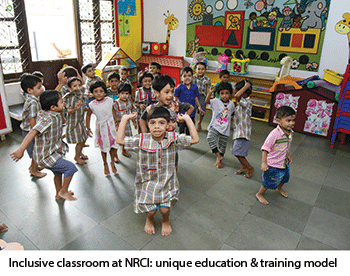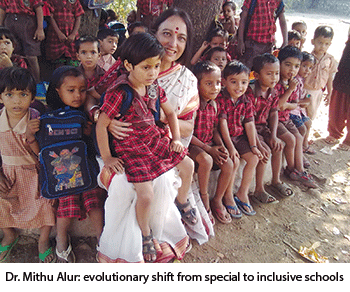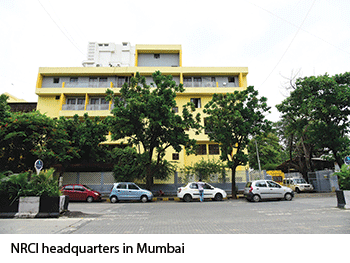ADAPT’s Determined Inclusive Education Mission
Founded in 1972 as the Spastics Society of India and rechristened ADAPT (Able Disabled All People Together) in 2007, this pioneer special needs education NGO has transformed into the country’s foremost advocate of inclusive education for children and youth with disabilities
 Four decades since its first education-cum-therapy centre opened its doors to three special needs children in Colaba, Mumbai, the Spastics Society of India (SSI, estb. 1972) rechristened ADAPT (Able Disabled All People Together) in 2007, has successfully engineered a unique education and training model which has empowered children and young adults with disabilities to become gainfully employed in mainstream vocations. The country’s foremost special needs education NGO, ADAPT’s services include assessment and diagnosis, therapy, counselling, inclusive education, skills training, job placement, and home management programmes for differently abled children. Currently, ADAPT’s paramedical, educational, vocational and community services impact over 3,000 children and 10,000 families in Mumbai.
Four decades since its first education-cum-therapy centre opened its doors to three special needs children in Colaba, Mumbai, the Spastics Society of India (SSI, estb. 1972) rechristened ADAPT (Able Disabled All People Together) in 2007, has successfully engineered a unique education and training model which has empowered children and young adults with disabilities to become gainfully employed in mainstream vocations. The country’s foremost special needs education NGO, ADAPT’s services include assessment and diagnosis, therapy, counselling, inclusive education, skills training, job placement, and home management programmes for differently abled children. Currently, ADAPT’s paramedical, educational, vocational and community services impact over 3,000 children and 10,000 families in Mumbai.
Founded in 1972 by Dr. Mithu Alur, a pioneer of inclusive education in India, “to establish rights and entitlements for children, youth and families with disability, and to introduce reformative action in policy and legislation so that all existing laws and services of education, health, welfare and employment are inclusive, thereby ensuring that the disabled who today suffer massive exclusion in the country are mainstreamed and employed,” ADAPT runs four education/therapy centres and a skills development centre in Mumbai — a model replicated in 24 states countrywide.
HISTORY
 An English literature alumna of Delhi University, Mithu Alur’s extraordinary journey began as a young mother who refused to accept the medical prognosis that her daughter Malini, born in 1966 and diagnosed with cerebral palsy, would remain a vegetable throughout her life. (Malini is a double postgraduate of London University, an internationally acclaimed activist and co-chairperson of the ADAPT Rights Group). In 1968, given the conspicuous lack of education and therapy facilities for disabled children in India, Alur moved to London and enrolled two-year-old Malini in a special needs school while she trained as a special educator at the Institute of Education, University of London. In 1972, the family returned to Mumbai to promote the Spastics Society of India (SSI) in an army bungalow in Colaba.
An English literature alumna of Delhi University, Mithu Alur’s extraordinary journey began as a young mother who refused to accept the medical prognosis that her daughter Malini, born in 1966 and diagnosed with cerebral palsy, would remain a vegetable throughout her life. (Malini is a double postgraduate of London University, an internationally acclaimed activist and co-chairperson of the ADAPT Rights Group). In 1968, given the conspicuous lack of education and therapy facilities for disabled children in India, Alur moved to London and enrolled two-year-old Malini in a special needs school while she trained as a special educator at the Institute of Education, University of London. In 1972, the family returned to Mumbai to promote the Spastics Society of India (SSI) in an army bungalow in Colaba.
“The initial years were very difficult. Societal attitudes to children with special needs were a greater disability than the disability itself,” says Dr. Alur recalling that she encountered ignorance, pity and indifference. “It was a Herculean task to convince people that though cerebral palsy was a non-curable condition, it was amenable to therapy and training. SSI’s message was that through early intervention, therapy and training, children and youth with disability can be empowered to become independent and productive members of society.”
In 1998, after providing special education services for more than two decades, ADAPT initiated an evolutionary shift from special schools to inclusive education. This breakthrough was an outcome of Alur’s doctoral research titled Invisible Children: A Study of Policy Exclusion (London University) which revealed the alarming exclusion of children with disabilities from the Union government’s Integrated Child Development Services (ICDS) programme, which runs 1.34 million anganwadis (nutrition centres for infants which also provide rudimentary early childhood education) and the Sarva Shiksha Abhiyan (Education For All) programme. Consequently in 1999, ADAPT established the National Resource Centre for Inclusion (NRCI) in Mumbai in collaboration with the Canadian International Development Agency (CIDA) to develop and promote inclusive education policies. The same year, the first inclusive CIDA-supported Ugam (Sanskrit for origin) anganwadis were set up in Dharavi, Asia’s largest slum settlement.
Moreover, as a result of her tireless efforts to champion the rights of challenged children, the Union government accepted their inclusion into mainstream schools as a cardinal principle of its education policy. The Right of Children to Free and Compulsory Education (RTE) Act, 2009 was modified by a special Amendment Act passed by Parliament in April 2012, to specifically include children with special needs within the category of poor neighbourhood children, for whom the RTE Act reserves a 25 percent quota in classes I-VIII of private unaided non-minority schools.
“Educational exclusion of disabled children continues in India despite the RTE Act amendment. Over the past 15 years, ADAPT and NRCI have successfully developed a model of desegregation which enables able-bodied children to learn happily with their disabled peers. Our Dharavi project has proved that inclusion can happen from the preschool level onwards among disadvantaged communities. If all children grow up, socialise and learn together, the character of the nation’s classrooms and of society itself will become more compassionate and caring,” says Alur, who adds that currently 60 million differently abled children and youth in India are denied equal education.
While initially ADAPT’s projects were largely funded by private individual donations, over the years it has received generous support from corporates, philanthropists, international development organisations as well as government bodies. Among its biggest donors are Hindustan Petroleum Corporation Ltd and Citibank. The annual budget of ADAPT is Rs.6.5 crore.
INITIATIVES
 Education & therapy. ADAPT’s Bandra and Colaba centres offer inclusive education, therapy (occupational, physio and speech), counseling, home management and pre-vocational training to over 200 children. The NGO has also partnered with 76 mainstream schools in Mumbai which adopt education practices that support and promote inclusion of all students.
Education & therapy. ADAPT’s Bandra and Colaba centres offer inclusive education, therapy (occupational, physio and speech), counseling, home management and pre-vocational training to over 200 children. The NGO has also partnered with 76 mainstream schools in Mumbai which adopt education practices that support and promote inclusion of all students.
Training. Since Dr. Alur introduced a first-of-its-kind postgraduate diploma in education for the physically handicapped in 1978, ADAPT has trained over 400 teachers and 250 master trainers under the Asia-Pacific community initiatives in inclusion courses run with the support of the Women’s Council, UK. In addition, 85,000 primary school teachers and 900 teachers and supervisors of the ICDS programme have been sensitised and trained in inclusive education practices. Effective from October this year, the Mithu Alur Centre for Disability Studies will offer postgrad diploma/certificate courses in the areas of education, disability, inclusion and human rights.
Community service. Currently, ADAPT’s community centre in Dharavi provides care and support to youngest children (three-five years) from 100 households.
 Mithu Alur Foundation. The foundation was promoted in 2008 under the aegis of ADAPT with the objective of creating inclusive schools in rural areas. Currently 22 villages in Pelhar, Maharashtra are covered by the foundation.
Mithu Alur Foundation. The foundation was promoted in 2008 under the aegis of ADAPT with the objective of creating inclusive schools in rural areas. Currently 22 villages in Pelhar, Maharashtra are covered by the foundation.
ADAPT Rights Group (ARG). Initiated in 2001 by Malini, ARG activities include awareness and empowerment courses for people with and without disability, access audits for corporates to determine if their premises are disabled friendly, and advocacy of disabled-friendly public places, public transportation and work spaces.
Skills training. Over the past two decades, the Skills Development Centre (estb. 1989) in Chembur has trained over 400 students in vocations such as computer operations, food processing, light engineering, etc.
FUTURE PLANS
“Skills development is an important focus area for us. A new project on ceramics and pottery was introduced this year with support from Worley Parsons, an Australian engineering company. ADAPT and Citibank are now collaborating to set up the ADAPT/Citi Centre for Advanced Learning and Inclusive Employment. Moreover, we have conceptualised ADAPT 29 to empower teachers, policy makers, and organisations by creating zonal hubs across the country. The objective is to train teachers to include children with disability, thereby increasing the number of inclusive schools in 29 states and to work with companies, government and other service organisations to include differently-abled persons in the workplace. We are committed to intensifying our efforts to achieve our vision of building an inclusive society,” says Alur.
Meher Pestonji
















Add comment